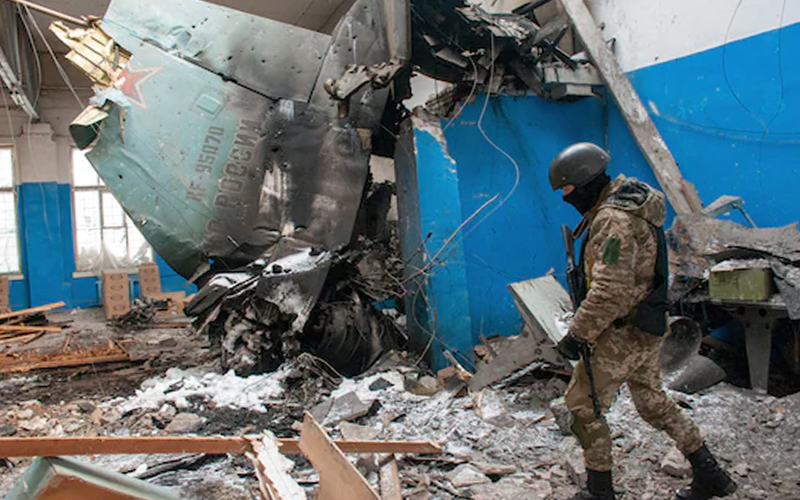 |
| In Kharkiv, Ukraine, on March 8, a Ukrainian soldier walks by the wreckage of a Russian Su-34 bomber laying in a damaged building. (Andrew Marienko/AP) |
David Von Drehlez: Russia's bombing of civilians of Ukrainian cities may appear to be a show of power. Millions of people have been displaced, and entire cities have been demolished. The true story, three weeks into Vladimir Putin's terrible mistake, is Russia's weakness.
The lack of fighting in Putin's offensive does not appear to be a tactical failure. Instead, it appears to be a lack of military force. True, the Russian commander miscalculated in believing that the Zelensky government in Ukraine would flee, leaving Kyiv in his hands. However, the updated tactics that the Kremlin is currently deploying are clearly not those of a twenty-first-century fighting force.
In fact, Putin's first folly, on February 24, is really quite telling. Russia launched its attack by approaching the superpower playbook set out by the US and its allies during the 1991 Gulf War. The Russians used precision-guided missiles to destroy radars, antiaircraft batteries, and runways across Ukraine after amassing a substantial ground force.
The aim of such targeted strikes is to blind and ground the enemy's planes, allowing the invading force to take control of the skies. Tanks and soldiers are then protected by air power as they confidently attack.
That never happened for Russia, according to Justin Bronk of the Royal United Services Institute, one of the world's oldest and best military think tanks. Step 1 has not yet resulted in Step 2. Russia failed to achieve air superiority. Its tanks and troops were quickly slowed, giving Ukrainian fighters time to plant mines, reinforce positions, and plot ambushes.
Bronk took note of this right away and wrote about it in an essay titled "The Mysterious Case of the Missing Russian Air Force" on February 28. Since then, analysts have been keeping a close eye on the skies, and little has changed. One could reasonably infer that it would never happen when Moscow's official news service, Tass, declared total Russian air supremacy.
Bronk provided this data point while considering the odd case: Russian air force pilots spend about 100 hours per year in the air. A third-rate economy can only afford that. A hundred hours each year equates to less than 20 minutes every day on average.
Bronk suggested that Russian "leadership may be unwilling to commit to large-scale military operations that would expose the gap between foreign views and the reality of their capabilities." Despite massive investments in advanced aircraft, Russian generals would prefer to have them parked menacingly on runways than have them fly ineffectively in battle.
The failure of Russia to build on its communication and information of modern force shows another flaw: It appears that precision munitions are in short supply. Smart bombs, whether laser-guided or GPS-guided, are becoming more common in 21st-century combat. Even smaller Western militaries have plenty of weapons. According to Exeter University defense specialist Michael Clarke, Britain possesses around nine smart bombs for every dumb one in its arsenal, while Russia's ratio is the inverse: nine dumb bombs for every smart one.
This could explain Russia's recent involvement in Syria. Putin, like his counterpart in Ukraine, ordered indiscriminate bombing with old weapons. However, several Western commentators felt that Putin was doing this to create doubt about whether the damage was caused by Syria or Russia.
Putin is now dropping dumb bombs on Ukraine, and the confusion has vanished. His initial discharge of precision missiles was simply a game of pretending. And it might have worked if Ukrainian President Volodymyr Zelensky hadn't remained strong in his opposition. Instead, Russia's military appears to be stuck in the 1970s.
Another vulnerability emerges as a result of this. Due to a lack of precision-guided weapons, Russia's attacks on Ukrainian cities must rely on relatively low-flying bombers and ground-based artillery. Inevitably, this implies more targets for the Ukrainian resistance, resulting in more Russian soldiers and pilots being killed – and greater sadness in Russia.
It's no surprise that Putin is now pleading with China's Xi Jinping for support. We would have seen it by now if he had enough power in his own war machine, for even the deluded Moscow ruler recognizes he is fighting for his life. There are suspicions that, in desperation, Putin would resort to chemical weapons, the dumbest of all bombs.
And this is the strongest Russia will ever be. Putin created this force when the world was still relatively peaceful, and the result has proven to be hollow as a piata. While extraordinary economic sanctions cut off his access to money and technology, he has little possibility of repairing the yawning gaps in his forces.
Russia's nuclear weapons will keep it safe from direct military attack. (It's not as though somebody is threatening an attack.) The disaster in Ukraine, on the other hand, signals the end of Russia's superpower status. Putin's preoccupation has unintentionally shown the extent of his country's decline.
Toisthe is not taking responsibility for this article. Toisthe collect this article and furnish it. All credit goes to David Von Drehlez, Washington Post.









0 Comments
please do not enter any spam link in the comment box